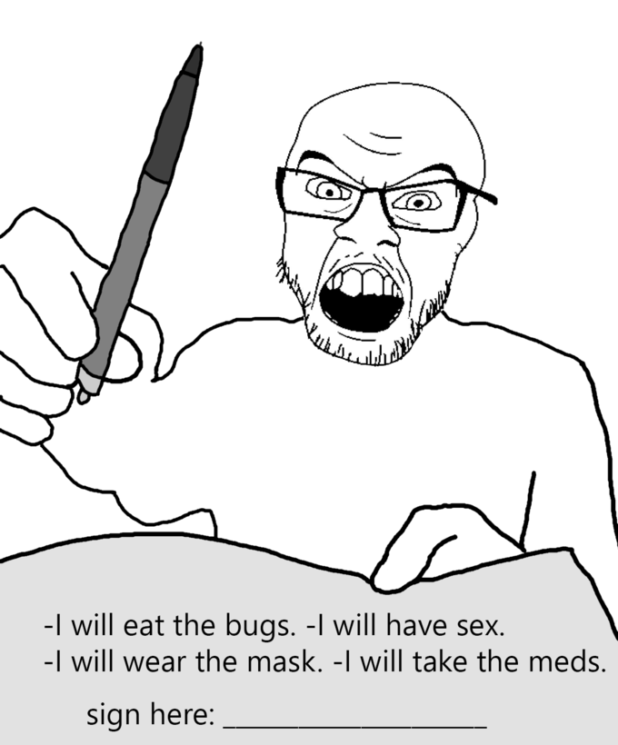
Previously: Mandatory Coronavirus Vaccine for All US Military Active-Duty Members Coming in September
We’re reaching the point where they’re going to start talking about holding people down and injecting them against their will.
People forget that Alan Dershowitz said that last year, before the vaxx was even developed.
The Pentagon’s effort to mandate coronavirus vaccination for all 1.3 million active-duty service members will continue to face resistance from a segment of the force, troops and observers say, until military leaders devise an effective strategy for countering pervasive doubt about the pandemic’s seriousness and widespread misinformation about the shots designed to bring it under control.
When Defense Secretary Lloyd Austin announced earlier this month that he would seek to require inoculation no later than mid-September, Pentagon data showed that thousands of personnel — about one-third of the force — remained unvaccinated. President Biden quickly endorsed the move.
The looming mandate comes as the virus’s highly transmissible delta variant fuels a new wave of infections globally, and after Biden, in what was widely seen as a signal to state and local governments and the private sector that they should follow suit, directed agencies throughout the federal government to implement proof-of-vaccination requirements or impose restrictions on employees who refuse. For military personnel, administration officials have said, the need is particularly urgent.
“Right now it’s being framed as a readiness issue,” said Katherine Kuzminski, a senior fellow at the Center for a New American Security, pointing to the current security crisis that has unfolded in Afghanistan’s capital, where thousands of U.S. troops were sent with little notice to help evacuate American citizens and U.S. allies following the Taliban’s takeover of the country. “As we see in Afghanistan, there is certainly a need to rapidly deploy people, and they may or may not be going to places that have relatively high rates of vaccinations.”
But, Kuzminski added, “I don’t think we’ve seen a vaccine that was [so] politicized.”
The Defense Department did not respond to a request for comment about its efforts to address vaccine hesitancy within the ranks.
Vaccine rates have varied widely between the individual service branches. In July, before Austin’s announcement, the Navy led the way with more 70 percent of its personnel fully vaccinated. At the low end, fewer than 60 percent of Marines met that criteria.
Though Pentagon officials have made clear a mandate is imminent, and that those who refuse risk losing their jobs, inoculation has been voluntary since the vaccines were introduced over the winter — a rare optional task in an organization where orders are the norm. Anecdotally, it appears at least some have viewed the lack of a requirement as grounds to infer the shots might not be safe despite a wealth of evidence to the contrary — or even that they’re unnecessary if their health and physical fitness is otherwise good.
“Just from talking to soldiers, picking their brains, some of the things I’ve heard have been ‘I don’t know the long term effects’ or ‘I just don’t know enough and it worries me,’” said Capt. Javon Starnes, a soldier at Fort Bragg in North Carolina. Starnes detailed his own bout with the virus in an episode of “The 18th Airborne Corps Podcast,” which also featured interviews with other soldiers from the base who espoused a variety of views on vaccinations, ranging from an early desire receive a vaccine to an ongoing reluctance.
“Me being a 24-year-old guy, I work out regularly, I think I’m pretty in shape,” Sgt. Colton Joiner said on the podcast. “I think if I were to weight the risk, I think at this time it’s not as much of a risk, it’s not that significant to me.”
Kuzminski, the military analyst, noted that age — and the relative youth of the armed forces compared to other government institutions — is likely a factor in voluntary vaccination rates.
“The reality is that there is some impermeability with young service members. They have a tough job, they put their lives on the line,” she said. “There is a certain sense of fearlessness.”
…
“What I’ve found from speaking to soldiers is that there are some who are, in a broad sense, skeptical of the government,” said Col. Joe Buccino, a military spokesperson for the XVIII Airborne Corps at Fort Bragg who, as host of the unit’s podcast, has explored the question of vaccine hesitancy among Army personnel. “And that is probably drawn from a broader skepticism within the American population, probably going back to the early 1970s.”
NPCs have a hard time understanding that some people may really like most vaccines yet refuse to inject themselves with experimental gene-therapy concoctions just because they’re labelled “vaccines.”
Apparently, these people don’t know what the corona vaxx is.
I can't get those in such positions such as military, healthcare and education who act like this is something new, no its not as you said they've been required in the past to get other vaccines why is this one any different.
— PAF (@paf_2) August 22, 2021
If they’ve received the normal vaccines mandated for all serving in the military, and they must have or they would not be Marines, then their objection to the covid vaccine is not religious but political.
— ???? ???? ??? ???! (@roywlewis) August 21, 2021
“Mandating the Covid vaccine is a slippery slope bc then they’ll mandate other medical procedures against your will” is a weird flex for military peeps who are required to take a bazillion other vaccines ?
— A cautionary tale, if nothing else (@CautionaryTale9) August 21, 2021
Me seeing all the people getting mandatory vaccine notices for civilian employment when I’ve had to get mandatory vaccines for 8 years in the military ?. pic.twitter.com/iNQBldTAAz
— Dylan (@Drivard4) August 20, 2021
Just because something comes in a syringe doesn’t mean it is a vaccine.
 Daily Stormer The Most Censored Publication in History
Daily Stormer The Most Censored Publication in History



